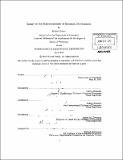Essays on the macroeconomics of economic development
Author(s)
Peters, Michael
DownloadFull printable version (11.30Mb)
Other Contributors
Massachusetts Institute of Technology. Dept. of Economics.
Advisor
Daron Acemoglu, Abhijit Banerjee and Robert M. Townsend.
Terms of use
Metadata
Show full item recordAbstract
Chapter 1 contains a theory of misallocation. In contrast to a recent literature where misallocation stems from imperfect input markets, I study an economy with non-competitive output markets. This change of focus has two implications. In the cross-section of firms, static misallocation, i.e. the dispersion of marginal products, is not driven by constraints limiting expansion possibilities, but reflects the distribution of mark-ups. Dynamically, the distribution of mark-ups and the economy-wide rate of productivity growth are jointly determined by firms' innovation and entry incentives. The observed cross-country variation in the degree of misallocation might therefore be a symptom of more fundamental differences in the innovation environment. Using firm-level data from Indonesia, I present both reduced form evidence for this mechanism and estimate the models' structural parameters. In chapter 2, I study the interaction between migration and firms' technology choices. If firms can adapt their production technology, changes in labor supply will induce biased technological adoption. I test this hypothesis using data from one of the largest population transfer programs of the 20th century. After WW2, Germany lost part of its Eastern Territories. Within 2 years, more than 8m people were expelled and transferred to Western Germany. Using individual-level data of the 1960s and 70s I show that refugees experienced substantial reallocation into unskilled occupations, that refugee-rich counties have higher employment shares in occupations which require little formal human capital and that wages in those occupations are especially high in refugee-rich counties. In chapter 3, which is joint work with Joaquin Blaum and Claire Lelarge, we use a comprehensive dataset of French manufacturing firms to study firms' import behavior. We first document a new fact on the extensive margin of international trade: most firms source only few differentiated varieties of a given product internationally. We then build a simple model based on productivity differences across firms and show that in contrast to the literature on exports, more productive firms do not necessarily source their products from more countries. On the intensive margin, the theory has one robust implication: expenditure shares across varieties should be equalized in the cross-section of firms. While the data is supportive of this prediction across foreign varieties, more productive firms are subject to "home-bias" in that they spend too much on domestic inputs.
Description
Thesis (Ph. D.)--Massachusetts Institute of Technology, Dept. of Economics, 2012. Cataloged from PDF version of thesis. Includes bibliographical references (p. 157-164).
Date issued
2012Department
Massachusetts Institute of Technology. Department of EconomicsPublisher
Massachusetts Institute of Technology
Keywords
Economics.